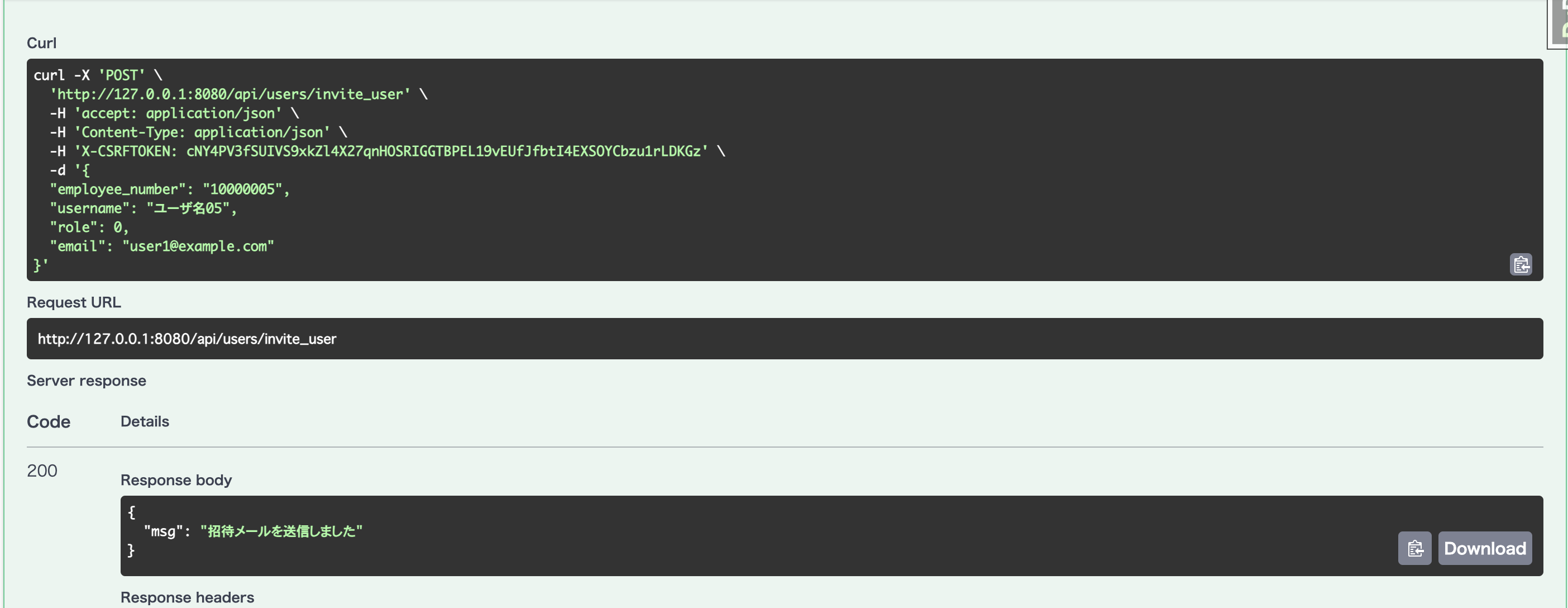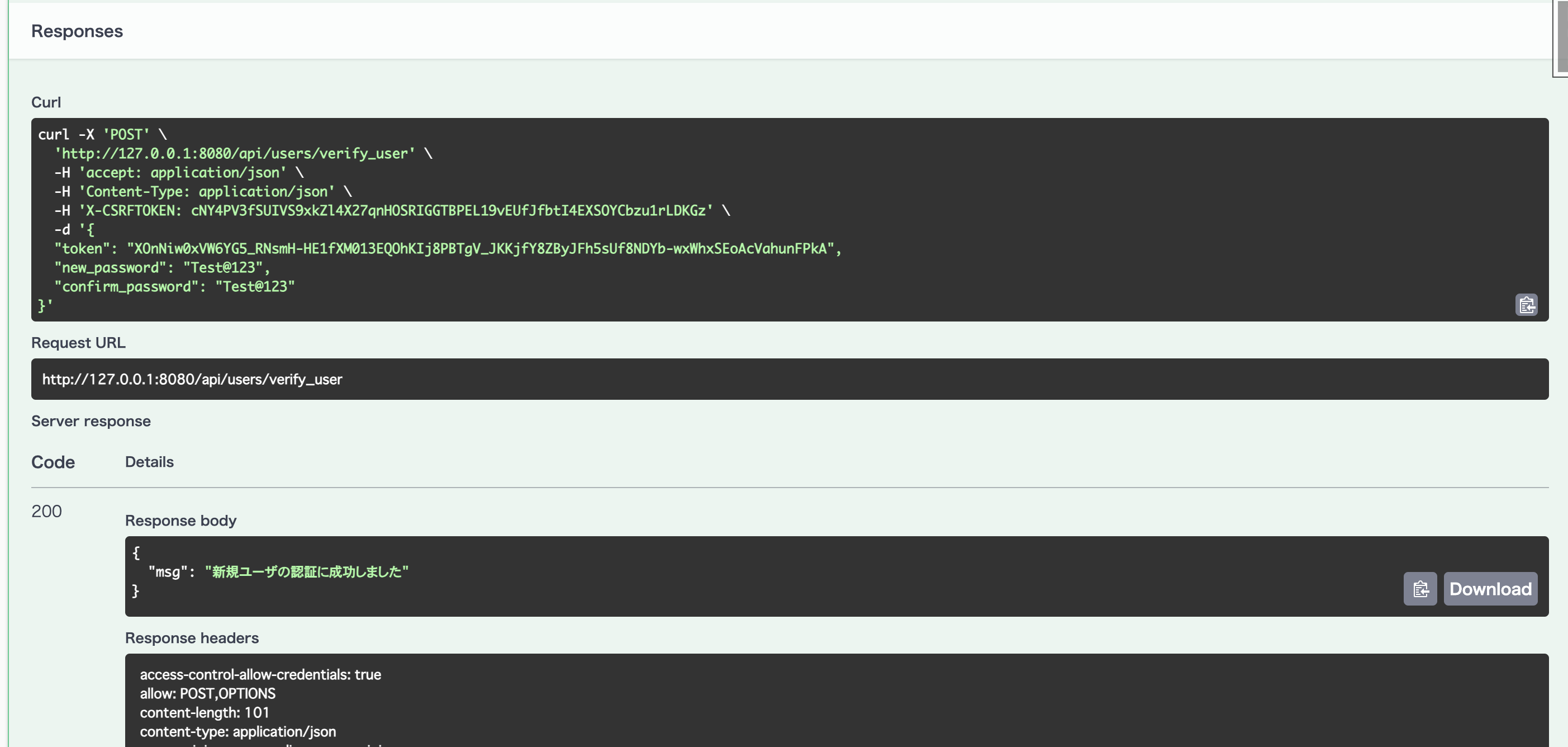概要
今回はDjango Rest Frameworkを使って
- ユーザへ招待メールを送信する
- トークンが有効であるか確認する
- 受信した招待メールのトークンを使ってユーザの認証を行う
APIの作成を行います
前提
- Djangoのプロジェクトを作成済み
ディレクトリ構成
tree
・
├── application
│ ├── __init__.py
│ ├── admin.py
│ ├── apps.py
│ ├── emails.py
│ ├── fixtures
│ │ └── fixture.json
│ ├── migrations
│ │ ├── 0001_initial.py
│ │ └── __init__.py
│ ├── models.py
│ ├── templates
│ │ ├── invite_user_email.html
│ │ └── invite_user_email.txt
│ ├── urls.py
│ └── views.py
└── project
└── settings.py
メールの設定
MailCatcherの設定
MailCatcherという仮想のSMTPサーバの設定を行います
詳細は以下の記事を参考にしてください
version: '3.9'
services:
db:
container_name: db
build:
context: .
dockerfile: containers/postgres/Dockerfile
volumes:
- db_data:/var/lib/postgresql/data
healthcheck:
test: pg_isready -U "${POSTGRES_USER:-postgres}" || exit 1
interval: 10s
timeout: 5s
retries: 5
environment:
- POSTGRES_NAME
- POSTGRES_USER
- POSTGRES_PASSWORD
ports:
- '5432:5432' # デバッグ用
app:
container_name: app
build:
context: .
dockerfile: containers/django/Dockerfile
volumes:
- ./backend:/code
- ./static:/static
ports:
- '8000:8000'
# デバッグ用ポート
- '8080:8080'
command: sh -c "/usr/local/bin/entrypoint.sh"
stdin_open: true
tty: true
env_file:
- .env
depends_on:
db:
condition: service_healthy
mail:
container_name: mail
image: schickling/mailcatcher
ports:
- '1080:1080'
- '1025:1025'
volumes:
db_data:
static:
Djangoの設定
settings.pyにMailCatcherとSESの設定を行います
if DEBUG:
# メールの設定
EMAIL_HOST = "mail"
EMAIL_HOST_USER = ""
EMAIL_HOST_PASSWORD = ""
EMAIL_PORT = 1025
EMAIL_USE_TLS = False
else:
# SESの設定
EMAIL_BACKEND = "django_ses.SESBackend"
AWS_DEFAULT_REGION_NAME = os.environ.get("AWS_DEFAULT_REGION_NAME")
AWS_SES_REGION_ENDPOINT = os.environ.get("AWS_SES_REGION_ENDPOINT")
DEFAULT_FROM_EMAIL = os.environ.get("DEFAULT_FROM_EMAIL")
.envファイルに必要な環境変数の設定を行います
AWS_DEFAULT_REGION_NAME=ap-northeast-1
AWS_SES_REGION_ENDPOINT=email.ap-northeast-1.amazonaws.com
DEFAULT_FROM_EMAIL=example.co.jp
BASE_URL=http://localhost
ユーザの招待機能
Model
- システムユーザ
- システムユーザの招待用トークンを管理する
用のModelを作成します
システムユーザのModelの詳細は以下の記事を参考にしてください
import uuid
from django.contrib.auth.models import AbstractUser
from django.contrib.auth.validators import UnicodeUsernameValidator
from django.core.validators import RegexValidator
from django.db import models
class User(AbstractUser):
"""システムユーザ"""
username_validator = UnicodeUsernameValidator()
class Role(models.IntegerChoices):
"""システムユーザのロール
Args:
MANAGEMENT(0): 管理者
GENERAL(1): 一般
PART_TIME(2): アルバイト
"""
MANAGEMENT = 0
GENERAL = 1
PART_TIME = 2
# 不要なフィールドはNoneにすることができる
first_name = None
last_name = None
date_joined = None
groups = None
id = models.UUIDField(
primary_key=True,
default=uuid.uuid4,
editable=False,
db_comment="システムユーザID",
)
employee_number = models.CharField(
unique=True,
validators=[RegexValidator(r"^[0-9]{8}$")],
max_length=8,
db_comment="社員番号",
)
username = models.CharField(
max_length=150,
unique=True,
validators=[username_validator],
db_comment="ユーザ名",
)
email = models.EmailField(
max_length=254,
unique=True,
db_comment="メールアドレス",
)
role = models.PositiveIntegerField(
choices=Role.choices,
default=Role.PART_TIME,
db_comment="システムユーザのロール",
)
created_at = models.DateTimeField(
auto_now_add=True,
db_comment="作成日",
)
updated_at = models.DateTimeField(
auto_now=True,
db_comment="更新日",
)
is_verified = models.BooleanField(
default=False,
db_comment="有効化有無",
)
USERNAME_FIELD = "employee_number"
REQUIRED_FIELDS = ["email", "username"]
class Meta:
ordering = ["employee_number"]
db_table = "User"
db_table_comment = "システムユーザ"
def __str__(self):
return self.username
class UserInvitation(models.Model):
"""ユーザ招待用テーブルに対応するモデルクラス"""
id = models.UUIDField(
primary_key=True,
default=uuid.uuid4,
editable=False,
db_comment="システムユーザID",
)
token = models.CharField(
max_length=255,
db_comment="ユーザ招待用メールURL用トークン",
)
expiry = models.DateTimeField(
null=True,
default=None,
db_comment="有効期限",
)
created_at = models.DateTimeField(
auto_now_add=True,
db_comment="作成日時",
)
user = models.ForeignKey(
User,
on_delete=models.PROTECT,
related_name="user_invitation",
db_comment="社員テーブル外部キー",
)
is_used = models.BooleanField(
default=False,
db_comment="使用有無",
)
class Meta:
db_table = "Invitation"
db_table_comment = "ユーザ招待用"
Serializer
- 招待用
- トークン認証とパスワード設定用
- トークンの有効期限の確認用
のSerializerを作成します
InviteUserSerializer内にUserの作成処理を作成します
VerifyUserSerializer内にvalidateメソッドを作成し、新規パスワードと確認用パスワードが一致するか確認します
もし一致してなかったらValidationErrorをraiseします
また、Djangoのvalidate_passwordメソッドを使って新規パスワードのバリデーションを行います
独自でValidationを設定していなかったら
get_default_password_validators()
メソッドからDjangoのデフォルトのパスワードのバリデーションを使用します
from application.models import User
from django.contrib.auth.password_validation import validate_password
from rest_framework import serializers
class UserSerializer(serializers.ModelSerializer):
"""ユーザ用シリアライザ"""
class Meta:
model = User
fields = ["id", "employee_number", "username", "email", "role"]
read_only_fields = ["id", "created_at", "updated_at"]
class InviteUserSerializer(serializers.ModelSerializer):
"""ユーザ招待用シリアライザ"""
def create(self, validated_data, created_by, updated_by):
return User.objects.create_user(**validated_data)
class Meta:
model = User
fields = [
"employee_number",
"username",
"group",
"email",
]
class VerifyUserSerializer(serializers.Serializer):
"""システムユーザ認証用シリアライザ"""
token = serializers.CharField(max_length=255)
"""パスワード登録用メールURL用トークン"""
new_password = serializers.CharField(max_length=255)
"""新規パスワード"""
confirm_password = serializers.CharField(max_length=255)
"""新規パスワード再確認"""
def validate(self, data):
if data["new_password"] != data["confirm_password"]:
raise serializers.ValidationError("新規パスワードと確認パスワードが違います")
validate_password(data["new_password"])
return data
class CheckTokenSerializer(serializers.Serializer):
"""トークンが有効であるか確認するSerializer"""
token = serializers.CharField(max_length=255)
"""トークン"""
def validate_password(password, user=None, password_validators=None):
"""
Validate that the password meets all validator requirements.
If the password is valid, return ``None``.
If the password is invalid, raise ValidationError with all error messages.
"""
errors = []
if password_validators is None:
password_validators = get_default_password_validators()
for validator in password_validators:
try:
validator.validate(password, user)
except ValidationError as error:
errors.append(error)
if errors:
raise ValidationError(errors)
Views
- invite_user(ユーザの招待)
- check_invitation_token(招待用トークンの有効期限確認)
- verify_user(ユーザの認証)
用のAPIを作成します
import os, secrets, logging
from datetime import timedelta
from django.contrib.auth.hashers import make_password
from django.db import DatabaseError, transaction
from django.http import HttpResponse, JsonResponse
from django.utils import timezone
from django.utils.crypto import get_random_string
from rest_framework import status
from rest_framework.decorators import action
from rest_framework.permissions import AllowAny
from rest_framework.viewsets import ModelViewSet
from application.emails import send_invitation_email
from application.models import User, UserInvitation
from application.serializers import (
VerifyUserSerializer,
InviteUserSerializer,
UserSerializer,
)
class UserViewSet(ModelViewSet):
queryset = User.objects.all()
permission_classes = [AllowAny]
logger = logging.getLogger(__name__)
def get_serializer_class(self):
match self.action:
case "invite_user":
return InviteUserSerializer
case "verify_user":
return VerifyUserSerializer
case _:
return UserSerializer
@action(detail=False, methods=["POST"])
def invite_user(self, request):
"""指定したメールアドレス宛へユーザの招待メールを送る
Args:
request: リクエスト
Returns:
HttpResponse
"""
# Userの新規登録と招待用トークンを作成する
serializer = self.get_serializer(data=request.data)
serializer.is_valid(raise_exception=True)
user = serializer.create(
serializer.validated_data,
)
token = secrets.token_urlsafe(64)
expiry = timezone.now() + timedelta(days=1)
UserInvitation.objects.create(
token=token, user=user, expiry=expiry
)
base_url = django_settings.BASE_URL
# 初回登録用のURLへ遷移
url = base_url + "/verify-user/" + token
send_invitation_email(
email=user.email,
url=url,
)
return JsonResponse(
data={"msg": "招待メールを送信しました"},
status=status.HTTP_200_OK,
)
@action(detail=False, methods=["post"])
def verify_user(self, request):
"""新規ユーザを認証する
Args:
request (HttpRequest): HttpRequestオブジェクト
Returns:
Union[
HttpResponse,
JsonResponse
]
"""
serializer = self.get_serializer(data=request.data)
serializer.is_valid(raise_exception=True)
user_invitation = self._check_invitation(serializer.data["token"])
if user_invitation is None:
return JsonResponse(
data={"msg": "こちらのURLは有効期限切れです"},
status=status.HTTP_400_BAD_REQUEST,
)
user_invitation.is_used = True
user_invitation.save()
user = user_invitation.user
user.is_verified = True
user.set_password(serializer.validated_data["new_password"])
user.save()
return JsonResponse(
data={"msg": "新規ユーザの認証に成功しました"},
status=status.HTTP_200_OK,
)
@action(detail=False, methods=["post"])
def check_invitation_token(self, request):
serializer = self.get_serializer(data=request.data)
if not serializer.is_valid():
return JsonResponse(data={"check": False})
check = self._check_invitation(serializer.data["token"]) != None
return JsonResponse(data={"check": check})
def _check_invitation(self, token):
"""ユーザ招待用トークンを確認する
Args:
token : ユーザ認証用トークン
Returns:
Union[
Invitationオブジェクト,
None
]
"""
try:
invitation = UserInvitation.objects.select_related("user").get(
token=token,
is_used=False,
)
except:
return None
if invitation.expiry < timezone.localtime() or invitation.is_used:
return None
return invitation
1つずつ解説していきます
ユーザの招待
Serializerを使ったバリデーションに成功した後、
ユーザを招待する際に
- User
- UserInvitation
を作成します
UserInvitation用のModelを作成する際にトークンの有効期限を24hとします
# Userの新規登録と招待用トークンを作成する
serializer = self.get_serializer(data=request.data)
serializer.is_valid(raise_exception=True)
user = serializer.create(
serializer.validated_data,
)
token = secrets.token_urlsafe(64)
expiry = timezone.now() + timedelta(days=1)
UserInvitation.objects.create(
token=token, user=user, expiry=expiry
)
- User
- UserInvitation
のデータの作成に成功したらメールを送信します
BASE_URLに今回はlocalhostを指定していますが本番環境ではドメインを指定します
メール内に招待用のurlを記載し、今回はMailCatcherへ送信します
下記のurlのパスはフロントエンドと相談して決める必要があります
base_url = os.environ.get("BASE_URL")
# 初回登録用のURLへ遷移
url = base_url + "/verify-user/" + token
send_invitation_email(
email=user.email,
url=url,
)
return JsonResponse(
data={"msg": "招待メールを送信しました"},
status=status.HTTP_200_OK,
)
トークンの有効期限の確認
メール内の招待用URLへアクセスする前にトークンが有効かどうか確認するAPIを作成します
トークンの有効期限、すでに使用されているかを確認し、
有効であれば
{"check": True}
無効であれば
{"check": False}
を返します
@action(detail=False, methods=["post"])
def check_invitation_token(self, request):
serializer = self.get_serializer(data=request.data)
if not serializer.is_valid():
return JsonResponse(data={"check": False})
check = self._check_invitation(serializer.data["token"]) != None
return JsonResponse(data={"check": check})
def _check_invitation(self, token):
"""ユーザ招待用トークンを確認する
Args:
token : ユーザ認証用トークン
Returns:
Union[
Invitationオブジェクト,
None
]
"""
try:
invitation = UserInvitation.objects.select_related("user").get(
token=token,
is_used=False,
)
except:
return None
if invitation.expiry < timezone.localtime() or invitation.is_used:
return None
return invitation
ユーザの認証
メールに添付されたurlへアクセスする際にフロント側からトークンの値を受け取ります
Serializerを使ったバリデーションに成功した後、
ユーザを認証する際にトークンが存在するか確認し、なければ404を返します
トークンの有効期限用のAPIを作成したので不要かと思われますが
例えば有効期限ギリギリにアクセスし、有効期限が過ぎてから認証しようとしてしまうことなど、
有効期限を確認するAPIでは検知できない不備を防ぐために記載しております
try:
user_invitation_password = UserInvitation.objects.get(
token=serializer.validated_data["token"]
)
except UserInvitation.DoesNotExist:
return JsonResponse(
data={"msg": "無効なURLです"},
status=status.HTTP_404_NOT_FOUND,
)
if (
user_invitation_password.expiry is not None
and user_invitation_password.expiry < timezone.now()
):
return JsonResponse(
data={"msg": "こちらのURLは有効期限切れです"},
status=status.HTTP_404_NOT_FOUND,
)
トークンが有効であることを確認した後、Userテーブル内に新しいパスワードを設定し、
- Userの有効化
- 招待用トークンの使用有無
のフラグをTrueにします
@action(detail=False, methods=["post"])
def verify_user(self, request):
"""新規ユーザを認証する
Args:
request (HttpRequest): HttpRequestオブジェクト
Returns:
Union[
HttpResponse,
JsonResponse
]
"""
serializer = self.get_serializer(data=request.data)
serializer.is_valid(raise_exception=True)
user_invitation = self._check_invitation(serializer.data["token"])
if user_invitation is None:
return JsonResponse(
data={"msg": "こちらのURLは有効期限切れです"},
status=status.HTTP_400_BAD_REQUEST,
)
user_invitation.is_used = True
user_invitation.save()
user = user_invitation.user
user.is_verified = True
user.set_password(serializer.validated_data["new_password"])
user.save()
return JsonResponse(
data={"msg": "新規ユーザの認証に成功しました"},
status=status.HTTP_200_OK,
)
メール送信機能
メール送信機能を実装します
メール送信の際はEmailMultiAlternativesクラスを使ってhtmlとtxtの両方のバージョンのメールを送信できるように設定できます
from django.core.mail import EmailMultiAlternatives
from django.template.loader import render_to_string
def send_invitation_email(email, url):
plaintext = render_to_string(
"invite_user_email.txt",
{
"email": email,
"url": url,
},
)
html_text = render_to_string(
"invite_user_email.html",
{
"email": email,
"url": url,
},
)
msg = EmailMultiAlternatives(
subject="アカウント登録のお知らせ",
body=plaintext,
from_email=None,
to=[email],
alternatives=[(html_text, "text/html")],
)
# 送信
msg.send()
メールの本文は以下の通りurlを入れます
下記URLへ24時間以内にアクセスしてアカウントの本登録をお願いします。
▼アカウント認証URL
{{ url }}
<pre>
下記URLへ24時間以内にアクセスしてアカウントの本登録をお願いします。
▼アカウント認証URL
<a href={{url}}>{{ url }}</a>
</pre>
urls.py
APIのパスを作成します
from django.urls import include, path
from rest_framework_nested import routers
from application.views import UserViewSet
router = routers.DefaultRouter()
router.register(r"users", UserViewSet, basename="user")
urlpatterns = [
path(r"", include(router.urls)),
]
実際にユーザを招待してみよう!
- 社員番号
- ユーザ名
- メールアドレス
を入力して/api/users/invite_user へrequestを送ります
以下のようなresponseが返ってきたら成功です
MailCatcher(127.0.0.1:1080)へアクセスすると以下のようにメールを受信できたことを確認したら成功です

- 先ほど受信したメールのトークン
- 新規パスワード
- 確認用パスワード
を入力して/api/users/verify_userへrequestを送ります

招待メールを再送したい時
再送したい時は以下のように招待用APIと分けて作成するのが一般的です
今回はSerializerを使わずに行います
@action(detail=True, methods=["post"])
def reinvite_user(self, request, pk):
"""ユーザを再招待する
Args:
request (HttpRequest): HttpRequestオブジェクト
Returns:
Union[
HttpResponse,
JsonResponse
]
"""
try:
user_invitation = UserInvitation.objects.select_related("user").get(
user_id=pk
)
except UserInvitation.DoesNotExist:
return JsonResponse(
data={"msg": "指定されたユーザは見つかりませんでした"},
status=status.HTTP_404_NOT_FOUND,
)
if user_invitation.user.is_verified:
return JsonResponse(
data={"msg": "指定されたユーザは認証済です"},
status=status.HTTP_400_BAD_REQUEST,
)
user_invitation.token = secrets.token_urlsafe()
user_invitation.expiry = timezone.now() + timedelta(days=1)
user_invitation.save()
base_url = django_settings.BASE_URL
user = user_invitation.user
url = base_url + "/verify-user/" + user_invitation.token
send_invitation_email(
email=user.email,
url=url,
)
return JsonResponse(
data={"msg": "招待メールを再送信しました"},
status=status.HTTP_200_OK,
)
以上です


